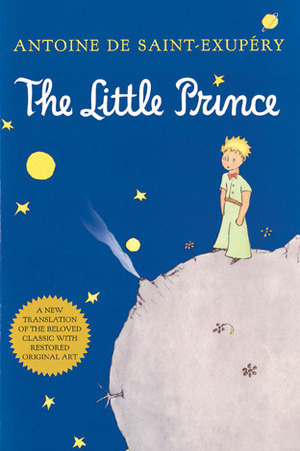What do you think?
Rate this book


96 pages, Paperback
First published April 6, 1943
"In the course of this life I have had a great many encounters with a great many people who have been concerned with matters of consequence. I have lived a great deal among grown-ups. I have seen them intimately, close at hand. And that hasn't much improved my opinion of them."Now, reading this intensely lyrical and mesmerizing book written by an ailing middle-aged adult far away from the country he loved in the middle of war-torn years, I am confronted with emotions that ruthlessly hurt, hidden in the deceiving simplicity of a (supposedly) children's story just like an elephant was hidden inside a boa constrictor - or was it simply a hat all along? - in the opening paragraphs of this book. I sigh and tear up, and try to resist the urge to pick up the golden-haired child that never stopped until he got answers to his questions and carry him away into safety. But I can't. Because if I do so, there will never be 500 billion bells in the stars, and we will never wonder whether the rose is still alive - and it needs to be, because we are responsible for those we have tamed.
"But I was not reassured. I remembered the fox. One runs the risk of weeping a little, if one lets himself be tamed."This is not a book for children. It's for adults who remember being children and feel nostalgia for the simple comfort of childhood innocence but know they can never go back to it. Because they have met their Roses, and Foxes, and drank from a well with a rusty handle in the desert, and learned that a few thorns may not stand against the claws of a tiger. Unlike the Little Prince, they can no longer go back - but they can look at the night starry sky and laugh, and imagine that they hear an answering clear laughter.
"In certain more important details I shall make mistakes, also. But that is something that will not be my fault. My friend never explained anything to me. He thought, perhaps, that I was like himself. But I, alas, do not know how to see sheep through the walls of boxes. Perhaps I am a little like the grown-ups. I have had to grow old."
'What makes the desert beautiful,' said the little prince, 'is that somewhere it hides a well.'


Þar sem ég hafði adrei teiknað kind dró ég upp fyrir hann aðra af þeim tveimur myndum sem ég var fær að gera: myndina af kyrkislöngunni utanverði.The first time I saw this, there were only a couple of words I felt at all sure about. Upp and var must be the same words as in Swedish ("up" and "was"). I soon figured out that ég was "I" (it is the same word in some Norwegian dialects), að was att ("that"), and hann was han ("he/him"). The words mynd and kind weren't like anything I recognised, but they were common, and having already come across them I realised they must be "drawing" and "sheep". As I read the book for the second time, the other words gradually fell into place too, and after a while I could read it as sort-of-Swedish:
Då som jag hadde aldrig tecknad får drog jag upp för honom den-andra av dem två teckningarna som jag var för att göra: teckningen av pytonormen utifrån.which I might render into sort-of-English as:
Then as I had never drawn sheep pulled I up for him the-second of the two drawings which I was able-to make: the-drawing of the-python from-outside.I recalled that there was a sentence something like this near the beginning of the story: it all made sense.





Á þriðja hnettinum bjó drykkjumaður. Heimsóknin þangað var mjög stutt, en hún fyllti litla prinsinn miklu þunglyndi.Black words like hnettinum ("planet", I think in the dative) and mjög ("very") are quite familiar, and I am reasonably confident that I've guessed the green and blue ones correctly. Only two words, stutt ("short"?) and þunglyndi ("depression"?) are in red, and these are indeed the ones I feel least certain about. I'm pretty much guessing stutt from context. I'm more confident about þunglyndi, since I know from other examples that þung, cognate to Swedish tung, is "heavy", lyndi is probably something related to Swedish lynne, "spirit", and there is a Swedish word tungsint, "heavy-spirited/depressed".
(At the-third planet lived drunkard. The-visit there was very ?short, but it filled the-little prince much ?depression)
